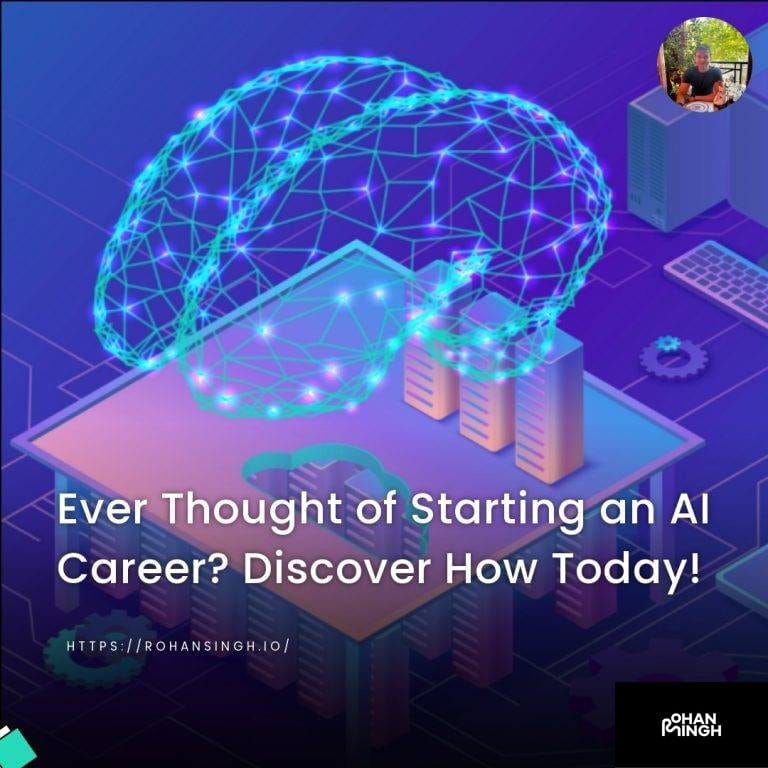Ever Thought of Starting an AI Career? Discover How Today!

Definition of Artificial Intelligence
Artificial Intelligence (AI) is a rapidly advancing field that focuses on creating intelligent machines capable of performing tasks that typically require human intelligence. It involves the development of algorithms and models that enable computers to learn from and make decisions or predictions based on data. AI has gained significant attention in recent years due to its immense potential in various industries, including self-driving cars, natural language processing, speech recognition, and predictive models. By mimicking the human brain and intelligence, AI aims to solve real-world problems and improve efficiency in a wide range of applications. To embark on a successful career in AI, individuals need to possess a strong understanding of statistics, programming languages, and machine learning algorithms, along with analytical and critical thinking skills.
Table of Contents
ToggleWhat is Machine Learning?
Machine learning is a crucial component of the field of artificial intelligence (AI). It empowers systems to learn and make predictions without explicit programming. By leveraging complex algorithms, machine learning enables AI to analyze and understand patterns in real-world data, leading to enhanced decision-making capabilities.
With machine learning, AI applications can predict outcomes and behaviors based on patterns and historical data. This ability to learn from data and adapt to changing circumstances is what sets machine learning apart from traditional programming approaches. Instead of coding every possible scenario, machine learning allows AI models to continuously improve and make accurate predictions.
Machine learning has numerous applications, ranging from self-driving cars to speech recognition and natural language processing. It plays a vital role in training models to identify and analyze complex data sets, enabling AI systems to address real-world problems effectively.
In summary, machine learning is an essential aspect of artificial intelligence that allows systems to learn, adapt, and predict outcomes without explicit programming. Its ability to handle complex algorithms makes it a key tool in creating sophisticated AI algorithms and applications.
Let's talk about your future project!
Eager to collaborate on your upcoming endeavor? Let's explore and ignite the potential of your next big idea, shaping a promising future together!
Benefits of AI and ML Prerequisites for a Career in AI & ML
Artificial Intelligence (AI) and Machine Learning (ML) have gained significant traction in recent years, with the potential to revolutionize various industries. If you are captivated by the prospects of advancements such as self-driving cars and predictive models, starting a career in AI can be a thrilling and rewarding path. However, before embarking on this journey, it is crucial to understand the prerequisites that will set you up for success in this field. In this article, we will explore the essential skills and knowledge required to pursue a career in AI and ML, enabling you to pave your way towards a bright future in this cutting-edge domain.
1. Develop a strong understanding of statistics and mathematics:
A solid foundation in statistics and mathematics is fundamental to comprehend the algorithms and models used in AI and ML. Knowledge of probability, linear algebra, and calculus will equip you with the necessary tools to analyze complex data sets, design algorithms, and interpret the results accurately.
2. Master programming and analytical skills:
Proficiency in programming languages such as Python, R, and Java is crucial for implementing AI and ML solutions. Additionally, honing analytical skills will enable you to identify patterns, generate insights, and make data-driven decisions. Familiarity with libraries and frameworks like TensorFlow and scikit-learn can empower you to build robust ML models effectively.
3. Gain hands-on experience with real-world problems:
While theoretical knowledge is important, practical experience in solving real-world problems is equally crucial. Engaging in personal projects, participating in competitions like Kaggle, or contributing to open-source projects can provide valuable hands-on experience. This allows you to apply your skills and gain a deeper understanding of AI and ML concepts.
4. Continuously update your knowledge:
Technology in the AI field evolves rapidly, making it essential to stay updated with the latest trends and advancements. Engage in continuous learning through online courses, attending workshops, or joining communities where you can exchange knowledge and collaborate with like-minded professionals.
By acquiring the prerequisites mentioned above, you will be well-prepared to embark on a successful career in AI and ML. Remember that a strong foundation in statistics, programming, and practical experience will enable you to tackle complex business challenges and contribute to the cutting-edge innovations in this field.

Programming Skills
Programming skills are a fundamental requirement in the field of AI and ML. With the increasing demand for AI applications across various industries, the ability to write efficient and effective code is essential for transforming ideas into reality.
Python, one of the most popular programming languages for AI and ML, offers a multitude of libraries and frameworks like TensorFlow and scikit-learn. These tools simplify the development process by providing pre-defined functions and algorithms, making it easier to build and train complex models. Moreover, Python’s simplicity and readability make it an ideal choice for beginners and experts alike.
Java, another widely used language, offers robust support for AI and ML through tools like WEKA and Deeplearning4j. Its scalability and performance are advantageous for handling large datasets and deploying AI applications in enterprise environments.
C++ excels in performance-critical scenarios, providing low-level access to hardware resources. It is commonly used for optimizing AI algorithms and implementing computationally intensive tasks.
R, known for its statistical functionalities, is favored by researchers and data scientists. It provides a wide range of libraries for data manipulation, visualization, and statistical modeling, making it suitable for exploratory data analysis and developing statistical AI models.
Mastering programming skills in these languages empowers AI and ML professionals to develop and deploy complex algorithms, build robust models, and manipulate large datasets efficiently. By leveraging the strengths of these languages, AI practitioners can unlock the potential of AI and ML to tackle real-world challenges effectively. So, if you are looking to start a career in AI, honing your programming skills in Python, Java, C++, and R is essential to succeed in this exciting and rapidly evolving field.
Mathematical Skills
Mathematical skills are essential for a successful career in Artificial Intelligence (AI) and Machine Learning (ML). A strong understanding of statistics is crucial in order to analyze and interpret data accurately. Statistics allows AI professionals to uncover patterns, trends, and relationships within complex data sets, enabling them to make informed decisions.
Probability is another important mathematical concept in AI and ML. It plays a significant role in creating AI models that can predict outcomes and make informed decisions. By understanding probability, AI professionals can calculate the likelihood of certain events occurring, enabling them to build accurate and reliable predictive models.
Advanced modeling techniques, such as linear regression and multivariate testing, also require a solid foundation in mathematical skills. Linear regression allows AI professionals to identify relationships between variables, while multivariate testing helps in analyzing the impact of multiple variables on a given outcome. These techniques are instrumental in solving real-world problems and developing AI solutions.
To excel in an AI career, it is essential to have a deep understanding of mathematical skills, including statistics, probability, and advanced modeling techniques. This knowledge will enable AI professionals to analyze complex data, develop accurate models, and make informed decisions to drive AI advancements.
Understanding Statistics
Understanding statistics is crucial for anyone looking to start a career in Artificial Intelligence (AI) and Machine Learning (ML). Statistics plays a vital role in analyzing and interpreting data, which is the foundation for AI and ML models.
To make sense of large data sets and identify patterns, AI professionals must have a solid grasp of statistical analysis techniques. Statistical methods help in summarizing and visualizing data, finding correlations, and making informed decisions. By understanding statistics, AI professionals can extract meaningful insights from complex data sets, enabling them to build more accurate and reliable machine learning models.
In the field of AI, statistical analysis is essential for tasks such as predictive modeling, image recognition, natural language processing, and speech recognition. It provides the framework for developing algorithms that can learn from data and make intelligent predictions. Without a good understanding of statistics, AI professionals may struggle to effectively analyze and interpret data, hindering the development of robust machine learning models.
In conclusion, having a strong foundation in statistics is vital for a successful career in AI and ML. It empowers professionals to make sense of large data sets, identify patterns, and build better machine learning models. By continuously honing their understanding of statistics, aspiring AI professionals can stay at the cutting edge of this rapidly evolving field.

Technical Skills
Starting a career in artificial intelligence (AI) and machine learning (ML) requires a solid foundation in various technical skills. The specific skills required may vary based on the discipline or specialization within the field, but there are common technical skills that are essential for any AI and ML professional.
Proficiency in programming languages such as R, Python, Java, and C++ is crucial. These languages are widely used in AI and ML for developing algorithms, implementing machine learning models, and analyzing data. Additionally, familiarity with tools and frameworks like Hadoop for big data processing and analysis is important in handling large datasets.
A strong understanding of database administration is also essential as AI and ML professionals work with vast amounts of data. Data analysis skills enable professionals to extract valuable insights from data, while data visualization skills allow for effective communication of those insights.
Quantitative analysis skills are vital to AI and ML professionals. Statistical methods and quantitative analysis help in analyzing data, identifying patterns, and making data-driven decisions. Having a deep understanding of mathematical concepts is also crucial for implementing complex algorithms and modeling.
In conclusion, a successful AI career requires a combination of technical skills. Proficiency in programming languages, database administration, data analysis, data visualization, and quantitative analysis lays a solid foundation for a career in AI and ML. By continuously updating and enhancing these technical skills, professionals can stay at the cutting edge of AI technology.
Knowledge of Machine Learning Technologies
Having a solid foundation in machine learning technologies is crucial for starting a successful career in artificial intelligence (AI). There are several key technologies within machine learning that AI professionals should be familiar with.
Supervised learning is one of the most commonly used machine learning technologies. In supervised learning, algorithms are trained on labeled data to make predictions or classifications. This technology is commonly applied in areas such as image recognition, speech recognition, and predictive modeling.
Unsupervised learning, on the other hand, involves training algorithms on unlabeled data to identify patterns or relationships within the data. This technology is particularly useful when working with complex data sets where the underlying structure or patterns are unknown. Applications of unsupervised learning include market segmentation, anomaly detection, and exploratory data analysis.
Reinforcement learning is another important technology in the field of AI. It involves training algorithms to make decisions based on interactions with an environment and receiving feedback or rewards for their actions. This technology is widely used in areas such as robotics, self-driving cars, and game playing.
Having knowledge of these machine learning technologies and their applications in solving real-world problems is essential for aspiring AI professionals. By understanding and leveraging these technologies, AI experts can tackle a wide range of complex challenges and pave their way to a successful career in artificial intelligence.
Understanding Human Language
Understanding human language is a fundamental aspect of Artificial Intelligence (AI) and Machine Learning (ML) applications. As AI systems aim to interact with humans and interpret the world, the ability to comprehend and communicate in human language becomes crucial.
Natural Language Processing (NLP) is a branch of AI that focuses on enabling computers to understand, interpret, and generate human language. NLP techniques allow machines to process unstructured data, such as text or speech, and extract meaningful information from it. This has numerous applications in areas such as voice assistants, sentiment analysis, and chatbots.
Computer Vision (CV) is another essential component in AI systems, as it enables machines to interpret and understand visual information from the real world. By analyzing images or videos, CV algorithms can identify objects, recognize faces, and even detect emotions. This is particularly valuable in applications like autonomous vehicles, surveillance systems, and medical imaging.
To achieve human-level performance in NLP and CV tasks, Deep Learning techniques are often employed. Deep Learning algorithms, inspired by the structure and function of the human brain, can analyze and process complex data sets more effectively. By utilizing artificial neural networks, deep learning models can enhance the accuracy and efficiency of language understanding and visual perception tasks.
In summary, understanding human language plays a vital role in AI and ML systems. Through the utilization of NLP, CV, and deep learning techniques, machines can interact with humans and interpret the world in a more natural and intelligent manner.

Natural Language Processing (NLP)
Natural Language Processing (NLP) is a crucial component in developing AI systems that can understand and interact with human language. By utilizing NLP techniques, machines are able to process unstructured data like text or speech and extract meaningful information from it. This has led to the development of virtual assistants like Siri or Alexa, which can understand and respond to human commands and queries.
NLP plays a significant role in improving customer service through the use of chatbots. These AI-powered assistants are capable of understanding and engaging in human-like conversations, providing quick and accurate responses to customer inquiries. By automating customer interactions, businesses can enhance their efficiency and improve the overall customer experience.
According to recent statistics, the global chatbot market is projected to reach $1.25 billion by 2025, with a compound annual growth rate of 24.3%. This highlights the growing demand for NLP-powered chatbots and the potential for a successful AI career in this field.
In conclusion, NLP is a crucial technology in developing AI systems that can understand and interact with human language. Its applications range from virtual assistants like Siri or Alexa to chatbots for customer service. With the growing market demand for NLP-powered solutions, pursuing an AI career in this field can lead to exciting opportunities and professional growth. So, if you are interested in AI and want to leverage the power of human language understanding, consider exploring a career in Natural Language Processing.
Speech Recognition
Speech recognition is a crucial aspect of artificial intelligence (AI) that enables computers to understand and interpret human speech. It has become an essential capability for virtual assistants and customer service chatbots, revolutionizing the way we interact with technology.
Through the use of sophisticated algorithms and machine learning techniques, speech recognition systems are able to convert spoken words into written text. This capability not only allows virtual assistants like Siri and Alexa to respond to our commands and questions, but also enables customer service chatbots to engage in human-like conversations with users.
Advancements in deep learning, a subset of machine learning, have greatly improved the accuracy and performance of speech recognition systems. Deep learning algorithms, modeled after the human brain, can analyze and process vast amounts of data to recognize patterns and make predictions. This technology has made it possible for speech recognition systems to achieve higher levels of accuracy, even in noisy environments or with accented speech.
With the increasing demand for virtual assistants and customer service chatbots, a career in speech recognition and artificial intelligence holds great potential. By staying up-to-date with the latest advancements in deep learning and acquiring the necessary technical skills, individuals can position themselves for success in this rapidly growing field.
In summary, speech recognition is a critical capability of artificial intelligence that enables computers to understand and interpret human speech. Advancements in deep learning have greatly improved the accuracy and performance of speech recognition systems, making it an exciting and lucrative field for AI careers.
Steps to Take to Begin Your Career in AI & ML
Artificial intelligence (AI) and machine learning (ML) are revolutionizing numerous industries, from healthcare and finance to transportation and entertainment. As the demand for AI and ML professionals continues to grow, starting a career in this field can be both exciting and rewarding. However, it can also be overwhelming to know where to begin. In this article, we will discuss the essential steps to take to kickstart your career in AI and ML, equipping you with the knowledge and tools necessary to succeed in this dynamic field.
1. Understand the Fundamentals: To embark on a successful AI and ML career, it is crucial to have a solid understanding of the basics. Familiarize yourself with key concepts such as machine learning algorithms, programming languages like Python or R, and statistics. Online courses and tutorials, such as those offered by Andrew Ng’s Coursera course or Stanford University’s AI and ML courses, can provide a comprehensive foundation.
2. Gain Practical Experience: While theoretical knowledge is important, hands-on experience is equally valuable. Engage in personal projects to apply your skills and build a portfolio. Utilize AI and ML libraries, such as TensorFlow or Keras, to develop predictive models or explore real-world problems. Joining online communities and participating in Kaggle competitions can also provide valuable experience and networking opportunities.
3. Specialize in a Niche: AI and ML encompass a broad range of applications, from computer vision and natural language processing to recommendation systems and reinforcement learning. Choose a specific area that aligns with your interests and career goals and dive deeper to develop a specialization. This will allow you to stand out in a competitive job market and become an expert in your chosen niche.
4. Stay Updated with Latest Advancements: AI and ML are rapidly evolving fields, with new research and technologies emerging regularly. Stay up-to-date with the latest advancements by following industry publications, attending conferences, and joining relevant professional organizations. This will not only expand your knowledge but also demonstrate your commitment to continuous learning, a crucial trait in this ever-changing industry.
In conclusion, launching a successful career in AI and ML requires a strong foundation in the fundamentals, practical experience, specialization in a niche, and staying updated with the latest advancements. By following these essential steps, you can position yourself for exciting opportunities in this cutting-edge field and become a vital contributor to the AI revolution.

Research Relevant Fields
Researching relevant fields is a crucial step when starting a career in AI and ML. By identifying specific industries and areas where AI can make a significant impact, individuals can narrow down their focus and tailor their skills accordingly.
One field where AI has immense potential is healthcare. AI applications in healthcare can help analyze large amounts of medical data to improve diagnostic accuracy, personalize treatment plans, and even predict disease outcomes. With the increasing demand for AI-driven healthcare solutions, there are numerous opportunities for AI professionals to contribute to the well-being of patients worldwide.
Another area to explore is environmental issues. AI can help address climate change, natural disasters, and other environmental challenges by analyzing complex data sets, predicting environmental patterns, and optimizing resource allocation. From monitoring air and water quality to managing renewable energy systems, AI can play a significant role in creating a sustainable future.
Computer vision is an exciting field within AI that focuses on enabling computers to understand and interpret visual information. From self-driving cars and surveillance systems to image recognition and augmented reality, the applications of computer vision are vast and varied.
Natural language processing (NLP) is another field of interest in AI. It involves teaching computers to understand and interpret human language, opening up possibilities in speech recognition, translation, chatbots, and sentiment analysis.
By researching and exploring these relevant fields, AI enthusiasts can gain a deep understanding of the industry-specific challenges and opportunities, enabling them to make informed decisions and shape their AI career path accordingly.
Gain Experience with Popular Programming Languages
To gain experience in the field of AI and ML, it is crucial to have a strong foundation in programming languages. Proficiency in popular programming languages such as Python, Java, C++, and R is essential for successfully implementing AI and ML algorithms, understanding statistical concepts, and aiding in data visualization.
Python, in particular, stands out as the preferred language for many AI and ML professionals. Its versatility, vast range of advanced libraries (such as TensorFlow, PyTorch, and Keras), and user-friendly syntax make it a go-to choice for developing AI models and conducting complex mathematical computations. Python’s extensive support for large-scale data analysis also makes it ideal for handling and processing massive datasets.
However, proficiency in other programming languages is also beneficial. Java is widely used for implementing mappers, which play a crucial role in processing data using frameworks like Hadoop and Apache Spark. C++ is known for its speed and efficiency, making it suitable for developing high-performance AI applications. R is often used for statistical analysis and data visualization, making it valuable in gaining a deeper understanding of the data.
By gaining experience with these popular programming languages, aspiring AI professionals can enhance their skills and broaden their capabilities, ultimately positioning themselves for a successful career in AI and ML.
Conclusion
Starting a career in artificial intelligence and machine learning can be a rewarding and lucrative path. The opportunities in the job market for AI and ML experts are vast and constantly growing. Companies across various industries, from self-driving cars to business applications, are seeking professionals with the skills to solve real-world problems using AI technologies.
Investing in education and skill development is crucial for success in this field. Understanding the basics of machine learning, programming languages, and statistical analysis are essential. Python, with its extensive libraries and user-friendly syntax, is a popular choice among professionals. However, proficiency in other languages like Java, C++, and R can also open up additional opportunities.
Hands-on experience and personal projects are invaluable for gaining practical knowledge and showcasing your abilities. Getting familiar with popular AI tools and applications like TensorFlow, PyTorch, and Keras is essential for building predictive models and solving complex problems.
With the job market for AI and ML professionals continuing to flourish, there has never been a better time to pursue a career in this field. By developing the necessary skills and staying updated with the latest advancements, aspiring professionals can carve out a successful and fulfilling career in artificial intelligence and machine learning. So, don’t wait any longer, start exploring this cutting-edge field and seize the countless opportunities it offers.
FAQ's
What is deep learning and how can I learn about it?
Deep learning is a subset of machine learning that focuses on artificial neural networks and algorithms. To learn about deep learning, it is recommended to start with a solid understanding of machine learning fundamentals. Online courses and tutorials, such as those offered by Stanford University and Andrew Ng’s deep learning specialization, can provide a comprehensive introduction to this field.
What are the prevalent tools and frameworks used in the industry?
There are several popular tools and frameworks used in the AI industry, such as TensorFlow, PyTorch, and Keras. TensorFlow, developed by Google, is widely used for tasks like image recognition and natural language processing. PyTorch, developed by Facebook’s AI Research lab, is known for its dynamic computational graph structure and is gaining popularity in the research community. Keras is a high-level neural network library that offers ease of use and prototyping capabilities.
How can I gain experience in the AI field?
Gaining hands-on experience is crucial in building a successful career in AI. Engaging in personal projects, participating in Kaggle competitions, and contributing to open-source projects are excellent ways to gain practical experience in AI. Additionally, internships or research opportunities with AI-focused companies or academic institutions can provide valuable real-world experience.
Is there an age limit for involvement in AI?
No, there is no specific age limit for getting involved in AI. AI is a field that welcomes individuals from diverse age groups. Whether you are a student, a working professional, or someone looking for a career change, as long as you have the passion and dedication to learn and contribute to the field, you can start a career in AI at any age.
What advice do you have for entrepreneurs interested in AI?
For entrepreneurs interested in AI, it is important to have a strong understanding of the field and its applications. Building a team with complementary skills, including technical expertise and business acumen, can significantly enhance the chances of success. Additionally, staying up to date with the latest advancements and trends in AI, attending conferences and networking events, and continuously learning and adapting to the evolving landscape of AI can help entrepreneurs thrive in this competitive industry.
Similar articles about Acquisition Strategy:
Ready to Plan Your Dream Trip with ChatGPT Vacation Planner?, Want to Experience the Magic of Third-Party ChatGPT Plugins?, How can Efficient Project Management Boost Your Success?, Looking to Boost Your YouTube Views? Use ChatGPT for Top-Notch Video Optimization!
Are You Leveraging SEO Audits to Win More Clients?, Ever Thought of Starting an AI Career? Discover How Today!, Can SEO Propel Your Store to 1 Million Monthly Visitors?, How Can Google Bard Supercharge Your SEO Content Strategy?
What Marketing Strategy Did Cheetos Employ for Plants vs. Zombies Collaboration?
Rohan Singh | May 1, 2024 | Acquisition What Marketing Strategy Did Cheetos Employ for Plants vs. Zombies Collaboration? Background on Cheetos Cheetos, a popular brand of cheese-flavored snacks, has made a name for itself with its bold and playful marketing strategies. Known for its irreverent and creative campaigns, Cheetos has consistently found unique ways […]
What Marketing Strategy Did Cheetos Employ for Plants vs. Zombies Collaboration?
Rohan Singh | May 1, 2024 | Acquisition What Marketing Strategy Did Cheetos Employ for Plants vs. Zombies Collaboration? Background on Cheetos Cheetos, a popular brand of cheese-flavored snacks, has made a name for itself with its bold and playful marketing strategies. Known for its irreverent and creative campaigns, Cheetos has consistently found unique ways […]
What Differentiates Differentiated Marketing Strategy from Undifferentiated?
Rohan Singh | April 30, 2024 | Acquisition What Differentiates Differentiated Marketing Strategy from Undifferentiated? Definition of Differentiated Marketing Strategy A differentiated marketing strategy is a targeted approach that focuses on creating unique products or services to meet the specific needs and preferences of different customer segments. It recognizes that customers have diverse tastes, preferences, […]
What Sets Apart the Marketing Concept from a Marketing Strategy?
Rohan Singh | April 29, 2024 | Acquisition What Sets Apart the Marketing Concept from a Marketing Strategy? Definition of Marketing Concept The marketing concept is a philosophy that places the customer at the center of all marketing activities. It focuses on understanding the needs and wants of the target market and delivering value to […]
Which promotional mix strategy targets market channel members?
Rohan Singh | April 28, 2024 | Acquisition Which promotional mix strategy targets market channel members? When it comes to promoting a product or service, companies utilize various strategies to reach their target audiences. One key strategy that directs marketing efforts toward market channel members is known as trade promotion. Trade promotion is a type […]
Should charter schools adopt regional or national marketing strategies?
Rohan Singh | April 27, 2024 | Acquisition Should charter schools adopt regional or national marketing strategies? Purpose When it comes to marketing strategy in the field of charter schools, two broad approaches can be taken: regional and national. Each approach has its purpose and benefits depending on the goals and aspirations of the charter […]
Topics :
Share :






